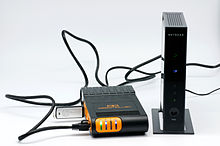 Afripedia Logo |



The Afripedia Project is a project to expand offline Wikipedia access in French-speaking Africa, and encourage Africans to contribute to Wikipedia. [1] The project installs local Kiwix-serve wireless and intranet servers and provides training and maintenance. [2]
Contents
The project offers content besides Wikipedia, such as Wiktionary. [3] Any content that is first packaged in a ZIM file can be relayed over the Afripedia network; [4] Project Gutenberg and Wikisource, for instance, are available in that format. [5]